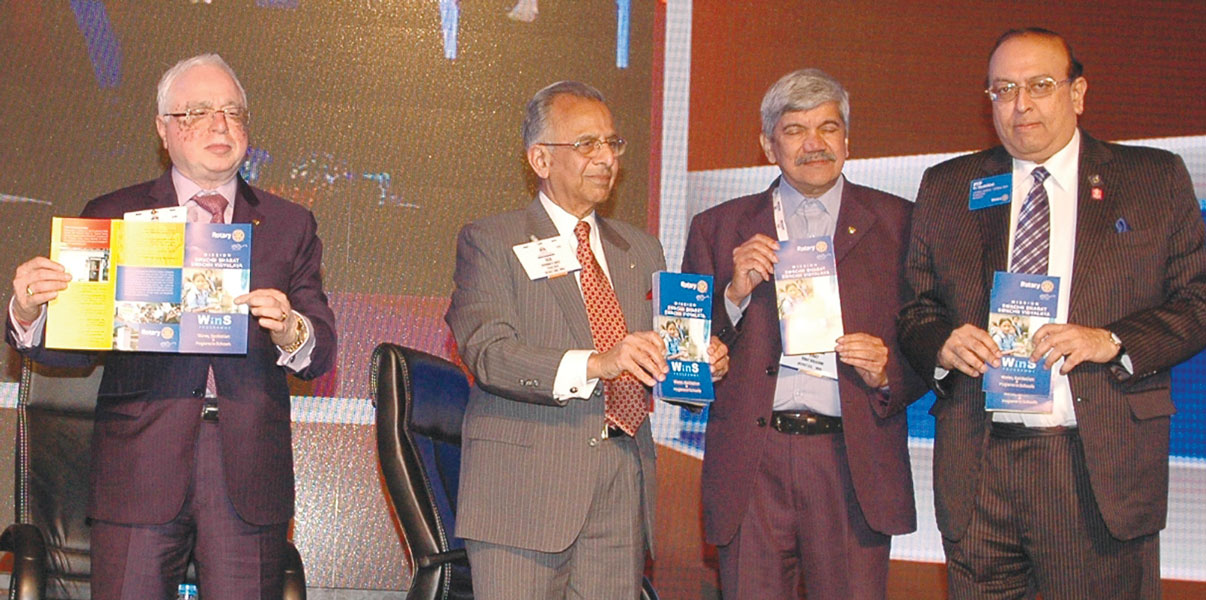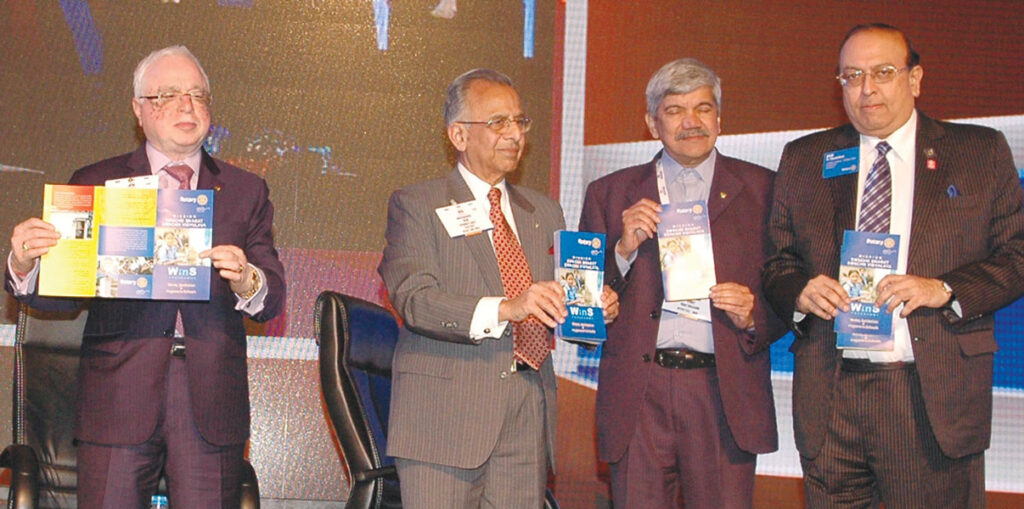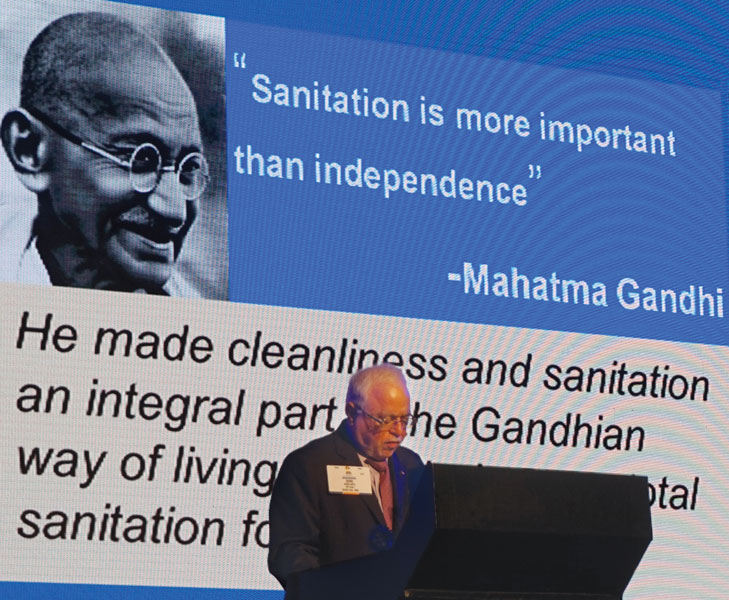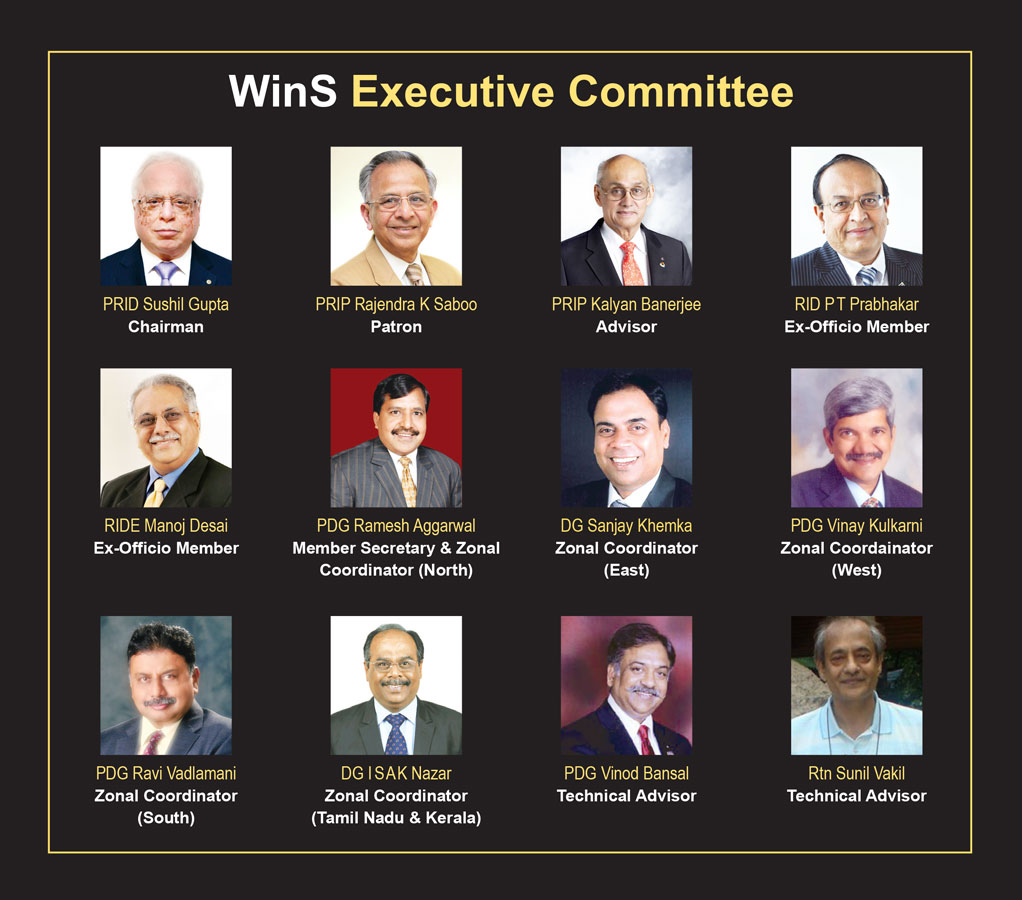While a large army of Rotarians in clubs across India, down to the smallest and remotest Rotary club, will be involved in the mega project Rotary India has taken on — to build a whopping 20,000 toilets blocks, the conductor of this orchestra is TRF Trustee Sushil Gupta. In all, Rotary will be building about 80,000 toilets, separate ones for girls and boys, in Indian schools.

Water activism is dear to his heart and his footprints — in dreaming big, planning, delegating and final execution — are amply evident in the 55 check dams the Rotary India Water Conservation Trust has already built in Rajasthan, greening a semi-dessert region. (See Rotary News, December 2014).
I love jumping into unchartered waters. My life has been like that.
Now, with a core group of senior Rotarians — PRIP Rajendra K Saboo as patron, PRIP Kalyan Banerjee as advisor and RID P T Prabhakar and RIDE Manoj Desai as ex-officio members, Gupta is chairing the WinS (WASH in Schools) project, which will partner the Government of India in building these 80,000 toilets in two years.

This is of course an integral part of the Swachh Bharat initiative that fits in beautifully with the Rotary objective of helping or improving the community in which Rotarians live. “We are doing much more than just building toilets. Where the toilets are missing, we will build them of course, but where they exist, we will get involved with the maintenance and ensure that the entire school, including the kitchen of course, functions in a hygienic environment,” says Gupta.
Genesis of WinS
Refusing to take credit for Rotary’s close involvement in the Swachh Bharat initiative — which had none less than Prime Minister Narendra Modi tweeting about it after Union Minister Venkaiah Naidu signed the Swachh Bharat declaration with Rotary at the Chennai Institute in December 2014 — Gupta says the credit for it goes to RID Prabhakar for contacting Naidu and both Prabhakar and PRIP Saboo, who together first met the Minister.
“But when we started preparing the Chennai declaration, the question came up as to how can Rotary help. When the dialogue started on what we could or could not do, I strongly encouraged/supported the idea that let’s think big … I love jumping into unchartered waters. My life has been like that.”
Unchartered waters
And then comes an interesting anecdote on how he learnt to swim. “I must have been just 10 years or so and one day my family members — my father, uncles and cousins — who were all very good swimmers, asked me to jump into a canal and I did so. Now jumping into a canal that is 10 ft deep is not easy, but I did it! From that time I can jump into any unchartered waters!”
Similarly even on this initiative, without any details, “I supported the idea that whatever we do should be on a big scale and we decided to do toilets.”
He estimates the number of missing toilets in Indian schools to be between 3.5 lakh to 4 lakh. “But whatever be the actual number,” the whole programme has now taken a very interesting, positive twist. That we will not only build toilets but assist with maintenance, assure availability of water and soap and ensure total hygiene. By doing so what we hope to bring around is behavioural change.”
Agents of change
What excites Gupta the most about this initiative is not finding the money, (“there is never shortage of money for any Rotary project,” he says firmly) or the actual construction and even maintenance. “We are confident that by ensuring Swachh Vidyalayas we will be ushering in behavioural change in young boys and girls. These students will demand and ensure toilets at home. And this is happening, in many areas where parents are already under pressure from their children and have started building toilets in homes. Next the neighbours will do so.”
Emphasising the underlying composite role of Rotary, which goes beyond building toilets, Gupta says “we will also ensure that hygienic behaviour is taught to the children in schools, and ultimately the Swachh Vidyalaya will become a passport to Swachh Bharat.”
On the funds required for building 20,000 toilet blocks, each with separate toilets for girls and boys, he adds that a Swachh Bharat Kosh has already been set up and PSUs are putting in Rs 1,000 crore into it. “And the cess proposed in the new Budget for Swachh Bharat will also bring in money. So funds are there; if money is not there Rotary will put in the money.” Recently in Pune, industrialist Rahul Bajaj, in a discussion with Rotarians said he is contemplating giving Rs 3 crore to Rotary, and he wants some of this money to be spent in Sikar district in Rajasthan where he was born.
Asked if it was Rotary’s integrity and thoroughness in doing a project, that made the GoI so keen to partner with Rotary, Gupta said the GoI’s experience of working with Rotary “for polio eradication was a milestone. The Government understands that when Rotary says something … promises something, they will deliver.”
Gupta says a few days earlier, Sanjay Singh, a former Rotary group exchange beneficiary, who now works as a senior executive with the Tata Group in Delhi, had said he looked upon Rotary “as a social organisation but with the power of a Government!”
Water activism
Gupta is passionate about water conservation and his experience in water activism goes back two decades when he was the vice chairman of the Himalayan Environmental Trust and chairman of the Gangotri Conservation Project. “My personal experience with water when we came to Delhi from Amritsar soon after the Partition, was that something which was available 24 hours and would come automatically up to the third or fourth floor without any electrical pump pressure, has become such a scarce commodity today. And Delhi is on the bank of the Yamuna which is a perennial water source.”
The Government understands that when Rotary says something … promises something, they will deliver.
Deeply pained that in the last 60 years “severe degradation has taken place in both, quality and quantity of water,” he says this has happened because we’ve not managed our water resources well. People need to be educated on this aspect of water management and Rotary is doing just that through this and other projects.
He agrees that some schools might face a challenge in ensuring water supply in the toilets that are built, but that would be a small percentage, and these “are not insurmountable problems.”
Capacity-building important
On the lessons he has learnt from his 20 years in water activism, the WinS Chair says, “One major lesson I learnt from my stints in the Himalayan and Gangotri projects was that capacity-building is very important. Any NGO — Rotary or otherwise — is not going to be there for all time to come. So you have to create a capacity. That is where we failed to some extent in those experiments.”
In WinS too, Rotary was not going to be involved in toilet building or school maintenance for all time to come. “You need to create capacity and capability so other people can take over and you can move on. Rotary can’t work in the same school after 10 years. So you have to create sustainable models that the society or community can carry on without you. That’s a very important lesson I’ve learnt.
Any NGO like Rotary is not going to be there for all time to come. So you have to create capacity and move on.
Meanwhile, this water activist’s thirst for helping or mentoring water projects remains unquenched.
Even before we begin the WinS interview, he tells me about his latest involvement … with water of course! In Vidharba and Marathwada regions where water scarcity has caused farmer suicides, “some Rotarians are talking about helping/reviving a river system … it is a very small river, not like the Ganga … which has been adversely affected because of forest degradation. This had happened with the check dams too in Rajasthan that you visited. We will work on this project too … let us see what can be done,” he smiles.
Pictures by Rasheeda Bhagat








